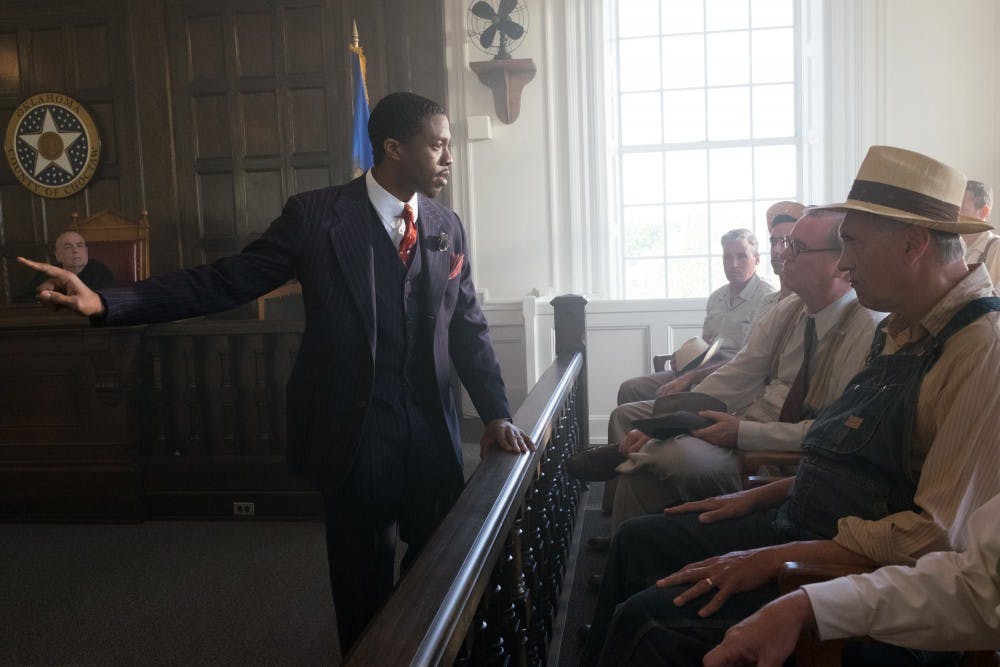Thurgood Marshall, a name almost every American has heard before. Perhaps best known for his role in Brown v. The Board of Education and for being the first African-American Supreme Court Justice, Open Road Film’s latest biopic directed by Reginald Hudlin, “Marshall” takes a look into one of the justice’s early, career-defining cases.
The brilliant Chadwick Boseman portrays Marshall in the film as he journeys to conservative Connecticut to defend an African-American chauffeur (Emmy winner and Golden Globe nominee, Sterling K. Brown) who is charged with sexual assault and attempted murder of his white employer (Kate Hudson). Silenced by the segregationist court, he has no choice but to partner with Samuel Friedman (Josh Gad) to mount a defense against racism and anti-Semitism.
The story is a great one and a smart move. Portraying the younger Marshall, not only is Boseman able to stretch his acting muscles, but it also leaves room to tell a less well-known story.
The audience is treated to a struggling Marshall in this film, one who is desperately trying to find that breakthrough case that will provide the NAACP with future funding and legs to stand on. This case could make it or break it, for him and Friedman and the tension of the moment is palpable through the proceedings.
In fact, in the courtroom is where this movie truly excels as the writing makes every word count. Long monologues that describe setting or motive feel captivating as they take you on a journey, not quite knowing if all will turn out okay. The star-studded cast also brings out their best. Boseman and Brown deserve special remarks for both of their performances throughout the film.
Enthralling from start to finish, Boseman carries charisma and charm, along with the emotional depth the performance craves. Brown proves his recent and past Emmy wins are well-deserved as his Joseph Spell suffers these grueling accusations feeling as though surrender may be his only option. In particular his examination on the witness stand drives is perhaps the film’s most moving moment.
Where this movie suffers, unfortunately, is in its execution of the moments in between. Certain themes, while important to express, are done so hurriedly, as though the film has somewhere to be at midnight. While it mentions at several moments anti-Semitism expressed toward Friedman, they are quick and don’t seem to carry over with them lasting effects for Friedman.
It does leave behind some glass slippers, but they never seem to quite fit the larger story as well as they could have. If anything, it is a tight squeeze.
Throughout the film, the movie is shot plainly, capturing the moments effectively enough but lacking any creativity save for a few key moments. There is never a low angle to express dominance, or a high one to express inferiority. While small details, these are essential things that could’ve made the movie that much better.
The best use of camera work and storytelling however is done in one of the film’s final moments, where Boseman celebrates his victory leaning against a wall where a “white’s only” sign is posted above a water fountain. Taking a swig of from the fountain, Boseman proudly gulps down the drink, reminding the audience that not only did Marshall and Friedman come out on top, but Boseman gave one memorable performance.
While Boseman and “Marshall” seems a match made in biopic heaven, it is unfortunate that the technical moments of the movie feel short.
Overall score: 3.5/5.
Rated PG-13, “Marshall” is in theaters now.
Reach the reporter at Owen.Baldner@asu.edu or follow @BaldnerOwen on Twitter.
Like The State Press on Facebook and follow @statepress on Twitter.




